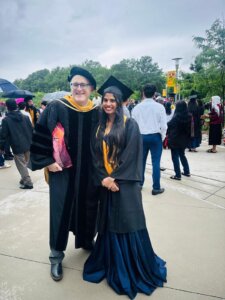A career in workplace psychology goes far beyond understanding people at work—it’s about helping people thrive at work.
We recently sat down with Aakanksha Sangepavu, M.P.S. ’25, a graduate of UMBC’s Industrial/Organizational Psychology program at the Universities at Shady Grove.
Her story highlights what it means to pursue meaningful, applied learning and how theory becomes real when used to shape better workplaces. From her beginnings in India to her capstone work with the USDA, Aakanksha shares the lessons, growth, and resilience behind her professional path.
Below is a lightly edited transcript of our conversation on UMBC Mic’d Up Podcast.
Check out the entire conversation!
Unique Journey
Dennise Cardona: You had a unique journey—from growing up in India to pursuing a master’s in I/O Psychology here at UMBC. What inspired you, and how did that path lead you to graduate school?

Aakanksha Sangepavu: My journey was shaped by curiosity and purpose. Growing up in India, where education and collective well-being are deeply valued, I was always drawn to understanding people—their behaviors, motivations, and challenges.
I started with general psychology in undergrad, then got a graduate certificate in Human Resources. But something was missing. I wanted to go deeper into why people behave the way they do at work—and how that impacts organizational outcomes.
When I discovered industrial-organizational psychology, it clicked. It brought together my interests in HR and human behavior, with my desire to improve workplaces.
UMBC’s M.P.S. program stood out because of its focus on applied learning. I didn’t just want theory—I wanted to use what I learned in real environments. This program gave me that opportunity, along with conversations with practitioners, hands-on projects, and access to a strong academic community. It helped shape not just my professional goals, but who I am today.
Context Matters Most
Dennise: Thinking back on your experience, what’s the most valuable professional lesson you’ve learned?
Aakanksha: One of the biggest lessons I’ve learned is that context matters most. You can have the best-designed interventions or training programs, but if you don’t understand the environment you’re working in, it can fall flat.
For example, at a startup job, I helped design a great onboarding training—on paper. But we hadn’t accounted for the time and resource limitations the team was facing. That experience taught me it’s not just about technical knowledge—it’s about listening, adapting, and co-creating solutions that work in the real world.
Capstone Experience
Dennise: Let’s talk about your capstone experience. You worked with the USDA’s Data Science Training Program. What was that like?

Aakanksha: It was eye-opening—challenging, but incredibly rewarding. I evaluated the program’s effectiveness from its launch in 2021 through 2025. Additionally, I conducted focus groups with participants, including those currently enrolled, graduates, and those who had dropped out.
I reviewed internal data on completion rates, mentorship, and satisfaction trends. It showed me how I/O psychology can drive real change in large organizations.
Problems like inconsistent onboarding or low mentorship weren’t just operational—they were tied to motivation, psychological safety, and retention. I used models like Kirkpatrick’s Training Evaluation and adult learning theory to make data-informed recommendations the USDA could actually use to improve future cohorts.
Understanding of Workplace Psychology
Dennise: How has your understanding of workplace psychology deepened through the program?
Aakanksha: One big realization was that when we talk about motivation or self-determination theory with stakeholders who don’t have an I/O background, it doesn’t always land. It sounds familiar, but they don’t always understand how it really affects the workplace.
The program helped me gain skills in collaboration and stakeholder communication, and I now see tools like that through a much more practical lens.
Importance of Human-Centered Skills
Dennise: That’s so important—especially now, when human-centered skills like communication and collaboration are becoming even more essential in the age of AI.
Aakanksha: Absolutely. And it all has to be tied with empathy. If we want to create systems that work for people, we need to understand their experiences. That’s what a career in workplace psychology means to me.
Career in Workplace Psychology
Dennise: You’re passionate about inclusive, people-centered workplaces. What does a truly “human” workplace look like to you?
Aakanksha: A place where people don’t have to leave part of themselves at the door. Where they feel respected, included, heard. Where their mental health matters. It doesn’t mean ignoring performance—it means reframing it through empathy.
To get there, organizations need to include employees in decisions, train leaders to be emotionally intelligent, and design policies that reflect lived experiences. It’s a balance of business goals and human needs.
Mentorship
Dennise: Let’s talk about mentorship. Who had the biggest impact on your journey?
Aakanksha: Mentorship was one of the biggest supports in my program. All the professors were approachable, but one person who truly stood out was Dr. Elliot Lasson, my capstone advisor.
He helped me trust my voice as a practitioner. I also want to thank Nidhi Mishra, an alum who mentored me through the process, even while managing her own work and life. Late-night conversations with her helped me realize I also want to be that person for someone else someday.
Advice for Prospective I/O Psychology Students
Dennise: What advice would you give to someone considering the I/O Psychology program at UMBC?
Aakanksha: Don’t be afraid to explore. The clearest path isn’t always the right one for you. I came into the program with a plan but discovered new interests through projects and peer conversations. I wanted to learn everything I could about launching a successful career in workplace psychology. UMBC gave me that chance.
Also: don’t wait for permission to lead. Even as a student, you can propose ideas, lead discussions, and mentor others.
Most importantly: wear confidence like it’s part of your outfit. Stay curious. Be open to unlearning and relearning. That’s what makes a great I/O psychologist—someone who never stops learning.
The Current Journey
Dennise: That’s such a beautiful perspective. What are you up to now?
Aakanksha: I graduated just over a month ago and jumped right into new opportunities. I’m currently enrolled in a few certificate courses and I’m proud to share that I’m now one of the directors of a startup in India. We’re focused on helping graduates showcase their talents and turn innovative ideas into impact.
Learn More
Dennise: Congratulations! That’s inspiring and exciting. Thank you so much for sharing your journey, Aakanksha. And to our readers, thank you for spending time with us today.
If you’d like to learn more about UMBC’s I/O Psychology program, visit the program page here.
